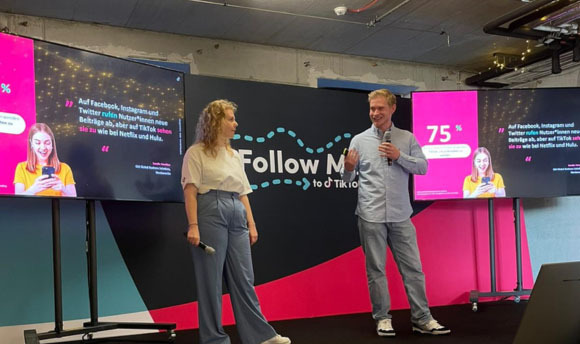We have a number of funded places for applicants ordinarily resident in Scotland wishing to commence this course either full time or part time starting in September 2026.
Find out more about this course at our spring postgraduate open events (May 2026).
International Marketing - MSc
Register today to find out more about the Queen Margaret Business School!
Suited to people from a wide range of backgrounds, this MSc International Marketing course is designed to give you the skills and confidence to succeed in marketing across different areas and countries. Inspiring you with hands-on experiential learning, we will teach you a broad range of marketing techniques and business skills.
Our course is designed to suit you whether you have a degree in a subject other than marketing or if you have a relevant undergraduate degree/professional experience and are looking to develop your skills and knowledge to give you the professional edge.
You can study this course full time or part time to fit around your existing life and work commitments. It has both a September and January start date.
Why QMU?
- Flexible study options: We offer full-time, part-time and single module study options.
- Engaging hands-on experiential learning: You can choose to participate in real-life marketing consultancy (helping you stand out in the jobs market when you graduate), and benefit from a range of expert guest lecturers and field trips to organisations across Scotland, along with a range of industry networking opportunities.
- An accessible route to a new career: This course has been designed in a way that students do not have to have come from a marketing background to apply.
- DMI accreditation: The module Digital Communications is accredited by the Digital Marketing Institute (DMI). The DMI accreditation shows employers that your degree and learnt skills/knowledge are up to date with the latest findings in marketing and that you have received a high quality multi-disciplined degree (see 'DMI accreditation' tab for more information). You will have access to Digital Marketing Institute resources as well as the possibility of obtaining accreditation for some additional modules depending on your choices.
- Tailor your future: We offer a flexible bespoke degree pathway allowing you to shape your learning to align with your future aspirations.
- Student-focused teaching and learning: Offering excellent teaching in smaller classes than at many other universities, the Queen Margaret Business School prides itself on its student-centered, contemporary teaching and assessment practice.
- Strong industry and professional links: The Queen Margaret Business School enjoys strong links with professional bodies associated with marketing, including the Marketing Society, which supports our Student Marketing Society. We are a member of the Chartered Association of Business Schools (CABS) and a signatory member of The Principles for Responsible Management Education (PRME). Our courses are designed through close collaboration with professional bodies including the Digital Marketing Institute and the Chartered Institute of Management Accountants. This means our qualifications are recognised by these bodies and upon successful completion of our courses, you can fast track your professional qualification should you wish to achieve one.
- We will set you up for study success and build your confidence: Your studies with us begin with an introductory module exploring what it is to be a master’s student, designed to place your postgraduate journey within a supportive environment and enable you to make the most of your postgraduate education, whatever your background. As you progress, you’ll complete a range of skills-based assessments allowing you to demonstrate your practical capabilities to potential employers.
Studying MSc International Marketing at QMU: academic interview
On this course you will gain the optimum balance of marketing theory and practice, including academic enquiry and practising the transferrable skills that are valued by large global corporations, small businesses and the public sector.
By the end of the course you will have in-depth knowledge of consumer behaviour, global branding, digital marketing, data analytics, innovation, strategy development, campaign management and more.
By encouraging you to become critically reflective, the course will develop your knowledge of the contemporary issues affecting marketing management and equip you with the practical skills that are essential for developing a career in this field.
A distinctive feature of the course is the opportunity to choose from a choice of three ‘capstone’ modules (Business Consultancy in Practice, Business Incubation or Dissertation), each of which is designed to build your skills, knowledge, and employability in a way that meets your individual needs.
If you choose the Business Impact and Practice module, you will engage in real-life marketing consultancy agreed between you, a client and tutors at QMU. This ‘real world’ practical experience in a marketing context will enable you to apply your theoretical knowledge in effective commercial action. This module is designed to build your confidence and your ability to reflect on both your past actions and future direction, as well as to develop your networking skills.
Structure and exit awards
You can opt to study for the full MSc (190 credits), a PgDip (130 credits) or a PgCert (60 credits). Please note all students will initially enroll onto the full MSc.
You can also register as an associate student to complete a single module for CPD. On completion of a single module, you may wish to complete further modules and progress your studies to a named award. Contact Abhilash SugunaNair for more information on single module study.
Teaching, learning and assessment
Teaching comprises a combination of lectures, seminars, tutorials, case studies, field trips and projects. The 'capstone' module for the course allows you to choose either a 'live' project for a client, the development of a business start-up proposal, or a master's level dissertation. Each of these options is intended to draw together elements of the taught course. The dissertation or project will be facilitated, monitored and assessed by tutors within QMU and, where appropriate, by staff within the organisation in which it is undertaken.
Assessment will take a variety of forms, including essays, reports, group and individual presentations, and website development. In our assessment methods, we have a particular focus on enabling you to demonstrate practical skills development, along with theory, making you particularly attractive to potential employers.
Placement
Students that choose to undertake the Business Consultancy in Practice module as their capstone project will have the opportunity to negotiate with an external client about a piece of ‘live' consultancy work. Students who are interested in a more formalised placement element should consider choosing the new two year MSc International Marketing with Professional Practice.
Teaching hours and attendance
If you are studying full-time, teaching normally takes place over two or three days, comprising both classroom-based learning and industry learning. You will also be required to carry out independent learning to support your formal teaching. Your specific timetable will depend on whether you are studying full-time, part-time or an individual module. Timetables are normally available approximately one month before you commence your studies.
Class sizes
It is anticipated that the cohort size for this course will be approximately 20-30 students. However, a number of the modules for the degree will be shared with other courses, so class sizes will vary.
Teaching staff
You can read more about the teaching staff on this page. Please note that teaching staff is subject to change.
You will study the following modules:
- Contemporary Issues in Business and Society: (15 credits): This module is taken in your first semester by all students as an introductory Business School postgraduate module and explores what it is to be a master’s student. It is designed so that all students enrolled onto the course can access this higher level of postgraduate education in an effective manner. This module aims to enable you to reach a well-grounded understanding of the theory and practice of international management and relate it to events taking place at a global and national level. Utilising the United Nations Sustainable Development Goals as a discursive element within the module, the ways in which business can positively contribute to achieving these will be critically evaluated.
- International Marketing (15 credits): Marketing is often perceived as being primarily entwined with advertising or convincing consumers to purchase items they may not know they need. However, we would highlight that marketing must be looked at much more holistically within an organisation. Having a critical oversight and direction toward who you are, what you have to say and connecting this with your target audience is an ongoing challenge. The module will question the application of marketing theories, practices, and concerns into our culturally diverse and complex World. The module will enable students to investigate, analyse and evaluate the role and scope of marketing activities within an international perspective and context.
- Digital Communications (20 credits): The evolution, diffusion, and adoption of digital technologies have fundamentally altered the way we live, work, relate to one another, and conduct business. These technological and societal changes are having a far-reaching impact on the communications, public relations and marketing disciplines, presenting huge challenges as well as opportunities to the industry. This module provides a sound theoretical and practical knowledge of digital communications based on a critical understanding of current and emerging technologies, digital strategies and social media platforms. The module examines a number of topics, including digital strategy; social media; search engine optimisation; online community building and management; stakeholder analysis; issues management; web analytics and big data; content marketing; web design; online customer journey; ethical and legal aspects of digital communications; and more.
- Consumer Behaviour and Global Branding (15 credits): The module is designed to provide an in-depth and critical understanding of consumer behaviour and how it informs organisational branding set within a global context. You will be introduced to the concept of consumer behaviour and its role in developing a targeted and coordinated brand strategy. This is also contextualised for consideration within a global context. A range of models of consumer behaviour are examined alongside branding strategies, how brands are created, the nature and influence of consumers on these brands, and lastly how culture influences the global approach taken within branding. The module further evaluates the psychological, social, and economic roots of the discipline of consumer behaviour and relates these to contemporary consumers. The module also addresses emerging themes and contemporary issues such as technological advanced, cultural and sustainability dimensions of brand identity, along with brand positioning, brand image, brand equity, branding strategies, cross cultural branding, and sustainability branding via the concept of environmental and social benefits within a global perspective.
- Data Analytics for Management Decision-Making: (15 credits): This module explores the sources of data, how that data is collected, processed, and presented, and then continues the data lifecycle by considering how this is used within informed decision-making processes within contemporary enterprises. With so much data noise, how can business be certain that the data they are using is reliable and valid? How can they then link that to a primary function within management and leadership, making decisions?
- Marketing Innovation and Campaign Management (15 credits): This module is designed to provide an in depth and critical understanding of market-driven product/service innovation. The characteristics of products/services and new product development are examined and critiqued. The contribution of both an organisational and individual entrepreneurial mind-set within a successful marketing function is investigated.
- Critical to most marketing activities is the communication and campaign/s that supports innovative products or services; how they are marketed, launched, the campaign that sustains the product in the marketplace and how effective campaign management acts as a differentiator for product amongst its competitors. Drawing upon contemporary theory and practice, the module explores the various issues associated with innovation and how to garner creative and engaging campaign strategies.
- Strategic Management (15 credits): This concerns itself with assessing what’s important, determining how to get there, and avoiding the potential pitfalls. By focusing on long-term sustainable success, practitioners can avoid the noise of the day-to-day. The module incorporates strategic concepts, tools and techniques that organisations can employ to assess their environment and resources and make strategic decisions towards long-term success. This is a mandatory module for all the Queen Margaret Business School MSc courses. Much of the knowledge and skills developed in this module are transferrable and useful in a broad range of management functions.
- Research Methods: Problems and Solutions (20 credits): Research has an important role within academic studies but is also a core skill for managers and leaders within contemporary enterprises. This module is designed to develop both theoretical research knowledge, and practical insights into the purpose, nature, execution, and value of research approaches and how these can be effectively utilised in the solving of problems in the context of academic knowledge creation or organisational professional practice.
Progressing to the MSc?
If studying for an MSc, you will also complete a Capstone module (60 credits). This takes the form of either 1. a 12,000-word Dissertation, 2. a Business Consultancy in Practice project, or 3. a Business Incubation Programme.
1. International Marketing Master's Dissertation: This is designed to enable you to develop, plan and critically evaluate a piece of research in the relevant degree subject related area, written up in the form of a dissertation. It offers the opportunity to conduct a substantial academic research project around a research topic of your choice.
2. Business Consultancy in Practice: This option will provide the opportunity to design and deliver a live project for a client. You will critically evaluate the consultancy role and practice through a live consultancy project. You will research, develop and deliver the project in collaboration with a business/organisation. The module will be assessed, not on the success of the project, but on your planning, problem solving and reflection upon the consultancy cycle which will include a researched client consultancy report and personal development plan.
While there may be the opportunity to work with staff to identify a partner business, the onus to find a real-world project will be on you. Recent project clients have included a major airline, global pharmaceutical company, whisky industry, top five bank, publishing house, European professional basketball team, food companies, charities, big three accounting and consulting organisations, global hotel brands, an Irish environmental company, online retailers, a local authority, an environmental energy agency, a major oil and chemical producer and a digital marketing agency.
3. Business Incubation Programme: If you have an entrepreneurial spirit and have always dreamed of starting your own business, then our Business Incubation Programme will best match your ambitions. Throughout your studies, this module will challenge you to critically evaluate a range of nascent, micro and family businesses. As you progress through the module, you will develop a new start-up business or social enterprise.
Support will be offered to you from inception to investigation and planning a new start-up business. Should you wish to launch a start-up, you can also access support through QMU's Startup Studio which is supported by our on-campus Business Gateway team.
Who are DMI?
DMI is an internationally recognised network of over 250,000 members working in every major city across the globe.
QMU has chosen to partner with DMI specifically in accrediting the Digital Communications module. The DMI accreditation shows employers that your degree and learnt skills/knowledge are up to date with the latest findings in marketing and that you have received a high quality multi-disciplined degree.
What does accreditation mean for me as a student on this course?
1. Membership
With DMI accreditation, all students taking the Digital Communications module will be given a membership account with the DMI. Students can log in to the DMI website at their leisure and can access a wealth of information to assist with their studies, keep up-to-date and discover what is happening in digital marketing today – all of which is sure to help with your future employability.
As a member, you will be able to:
- access an extensive database of marketing research resources such as articles, videos, eBooks, toolkits, specialised courses and lessons;
- view a back library of podcasts as well as view new biweekly podcasts from industry experts, which will help you sharpen your views and mindset;
- view monthly webinars delivered by guest speakers including some of the leading experts in digital marketing;
- access a glossary of industry terms which will ensure you understand what is meant by the terminology, acronyms and phrases used every day in the digital marketing industry; and
- access the DMI jobs board which will help you easily find current vacancies in the industry.
2. Qualification
As a student on the MSc International Marketing you will study the core module ‘Digital Communications’, which the DMI has specifically accredited. On completion of your degree, which requires that you successfully pass this module, you will obtain a CDMA (Certified Digital Marketing Associate) accreditation from the DMI.
This course has been carefully reviewed and designed to assist those who may or may not have previous marketing experience, providing you with the necessary skills, knowledge and experience to forge ahead with a new career in marketing.
You will be qualified for a broad spectrum of marketing and management positions within a range of businesses and other organisations, for example as a:
- marketing manager
- brand manager
- brand marketing executive
- product marketing manager
- consultant
For those who may already have a marketing background, the course will help, for example, by utilising the Business Consultancy in Practice module, to allow you to build in opportunities to create your own deeper learning and ensure you climb the career ladder.
Previous QMU graduates have gone on to work in marketing agencies, run their own business, work in a not-for-profit role and work in marketing and communications positions in industry in the UK, Europe and further afield.
Entry requirements
Applicants should have a UK honours degree or an overseas qualification of an equivalent standard in an appropriate discipline. We also welcome applicants with an ordinary degree who can show a period of relevant post-graduation work experience in a managerial role.
International: You will be required to provide evidence of English language competence at no less than IELTS 6.5 with no individual component score less than 6.0.
Other information
Fees for this course are calibrated to incorporate all transport and activities on field trips as well as practical classes. See Fees and Charges page.
Disability/health conditions
If you have a disability, long-term physical or mental health condition, or learning disability, it should not stand in the way of your studying at QMU. However, if you are not sure whether your disability might be a barrier in your studies or in relation to the professional standards, please contact the disability service who will be able to have a conversation with you about reasonable adjustments and supports available to you.
Applying for this course
For more information on applying, or to apply for this course, please follow the links in the 'Start your application' box at the top right of this page.
Application deadline
Home students: End of August for September 2026 start and December for January 2027 start.
International students: End of June for September 2026 start and end of November for January 2027 start.
Contact Abhilash SugunaNair (Programme Leader) or contact Admissions




- The delivery of this course is subject to the terms and conditions set out in our 2026/27 Entry - Terms and Conditions (Postgraduate).
- The information on this page is correct at the time of posting (October 2025) but is subject to change. In the event that modules change, QMU will seek to use reasonable endeavours to ensure that there is no detrimental impact on students. Please keep an eye on this page for updates.
We have a number of funded places for applicants wishing to commence this course either full time or part time starting in September 2026.
Postgraduate business degrees at QMU: a quick-fire overview
Queen Margaret Business School - hands on experiential learning
Become your best you: study at QMU
Course Overview
Useful Links
Join us at one of our Postgraduate Open Events
Find out about online and in-person opportunities to meet with us to find out more about our postgraduate courses and study at QMU.
Postgraduate Open Events - More Info and BookingsCourses You Might Also Like
- MSc International Marketing with Professional Practice
- MSc Accounting and Finance with CIMA
- MSc Accounting and Finance with CIMA with Professional Practice
- MSc Business Analytics
- MSc Business Analytics with Professional Practice
- MSc International Management and Leadership
- MSc International Management and Leadership with Professional Practice











